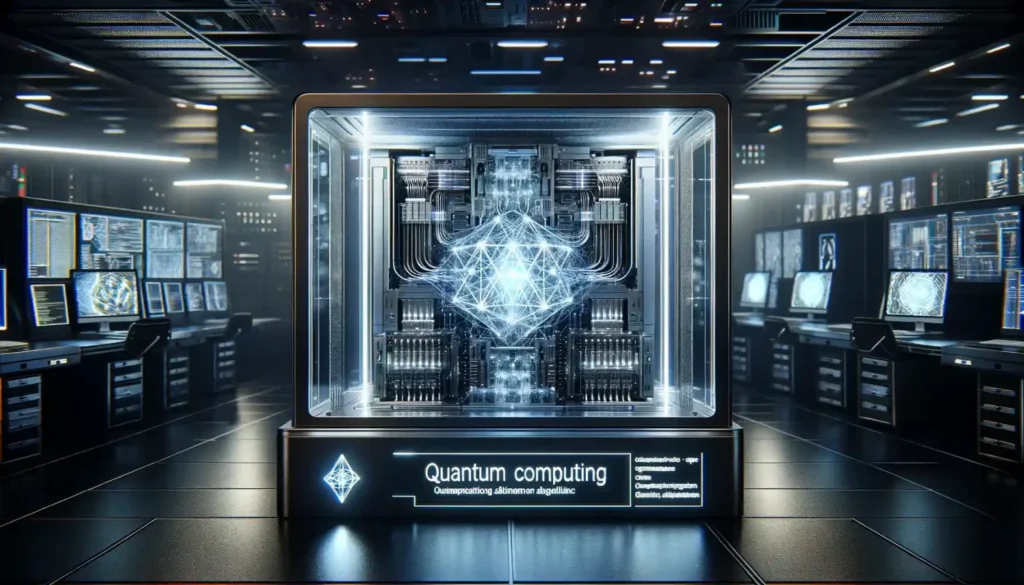What is Quantum Computing?
Quantum Computing is a new way of solving problems using the rules of quantum physics. As an alternative of standard bits like in traditionalistic computers, quantum computers use measure bits, or qubits. These qubits can hold triune values at once, thanking to a material possession known as superposition. This means computers can do many calculations at the same time. Additional key precept is the web where two qubits are coupled and involve each other’s state. These unusual features allow machines to solve tangled problems quicker than standard computers. Quantum Computing is not just a possibility any longer—it is becoming real, with growing enquiry and investment funds.
How Quantum Computing Works?

Quantum Computing works using the freaky behaviors of microscopic particles. Qubits can exist in triune states at once, different standard bits that are either 0 or 1. Superposition allows qubits to do many calculations at once. Web connects qubits in ways that boost computing power. Changing one embroiled qubit affects the other, nothing the space between them. Measure gates are used to ensure qubit states during trading operations. These gates act like logic trading operations in traditional computing, but in more tangled ways. As a resolution, measure computers solve problems by exploring many paths at once, not one by one.
Quantum Bits vs Neo-classical Bits:
The main departure between standard and Quantum Computing lies in how info is stored. Neo-classical bits can only be 0 or 1. In line measure bits [qubits) can be 0, 1, or both at the same time. This is doable because of superposition. When triune qubits are embroiled, they can store and work a tremendous amount of data. The power of a measure unit increases exponentially with each added qubit. For example, 10 qubits can symbolize 1,024 doable combinations at once. That’s something a standard figure would take much longer to work. This is why Q-Computing is so knock down.
Applications of Quantum Computing in Real World:

Quantum Computing is already making a departure in real—world industries. In healthcare, it can help in developing new drugs by simulating molecular interactions rapidly and accurately. In finance، measure algorithms ameliorate risk modeling and discover fraud more effectively than stream systems. Logistics companies use measurement tools to find the best pitch routes and shorten costs. In chemical science and material skills, measure computers reenact atoms and molecules to produce new materials. Cybersecurity also benefits as measure encoding methods offer improved aegis. Even clime modeling and endure forecasting are becoming more close with measure systems. These examples show its wide range of touch.
Quantum Computing in Inorganic Tidings:
Quantum Computing is supercharging dummy intelligence operation [AI]. AI systems need to work with large amounts of data rapidly and quantum computers help speed this up. Quantum automobile learning models can solve problems that would take standard computers too long. They also ameliorate model preference, optimization, and data clustering. Measure algorithms can train deep learning models quicker and more expeditiously. This leads to smarter, quicker AI systems that can make improved decisions. As a resolution, areas like robotics, voice preference, and sovereign vehicles will see major improvements. The mix of this technology and AI is one of the most knock—down tech trends.
Challenges Facing Quantum Computing:

Despite its prognostication, Quantum Computing still faces many challenges. One of the big problems is qubit stability. Qubits are very responsive to temperature, noise, and incumbrance. Even small disturbances can cause them to lose their measure state, leading to errors. This makes building straight measure computers exceedingly embarrassing. Cooling systems are necessary to keep qubits at arbitrary zero temperatures. Error rectification is also a big dispute in Q-Computing, and solutions are still being improved. Scaling up from a few qubits to thousands is an additional major vault. These specialized barriers must be resolved earlier for Q-Computing becomes mainstream.
Companies Leading in Quantum Computing:

Many tech giants and startups are leading the Quantum Computing race. IBM is one of the pioneers and offers cloud—based Q-Computing memory access. Google made headlines when it claimed mastery in 2019 by solving a job while standard computers couldn’t. Microsoft is working on an ascendable quantum software system and constructor tools. Intel is developing new types of qubit chips. Startups like Rigetti, IonQ and D Wave are also making potent work up in both ironware and software system. These companies are investing hard in enquiry, partnerships and developing. Their innovations are bringing Q-Computing close to real-world applications and mercantile use.
The Future of Quantum Computing:

The future of Quantum Computing looks unbelievably vivid. As ironware improves, measurement systems will turn more knock-down and unchanging. One day, quantum computers may outperform standard systems in many fields. Quantum cloud computing will allow more masses to access this power. Researchers consider measuring cyberspace may also turn doable, allowing ultra moated communications. In teaching, more universities are offering Q-Computing courses to train the next generation of experts. Governments and companies or so the world are investing hard in quantum enquiry. As work continues, Q-Computing could unlock new levels of inventio, skill, and engineering science acrosse globe.
Final Thoughts:
Quantum Computing is not just a future tense conception—it’s already shaping the world. With the power to solve problems on the far side of standard limits, it opens new possibilities in skill, business enterprise, and engineering science. As understanding and approachability grow, Q-Computing will turn a game-changer. It will translate industries, speed up invention, and drive new levels of efficiency. Now is the time to learn about it, adorn in it, and set up for its touch. Q-Computing is no longer a skill fable—it’s the beginning of a new realness.




